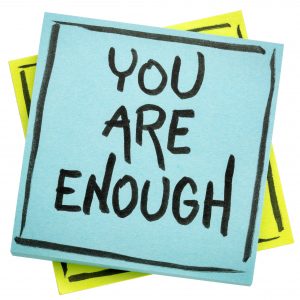Self-esteem is closely tied into how we see ourselves and the value we apply to ourselves. This value is completely subjective to our own experiences, how we perceive our place in life, and how harshly or generously we compare ourselves to others. Those who face low self-esteem often struggle with anxieties and depressed mood which in turn negatively alters the way in which they value themselves.
In active addiction we rarely are living life in a way that contributes value and quality to ourselves or to the lives of others. Work performance suffers when we show up late or try to get through the day hungover. We find that we are not mentally and emotionally present with family and friends when we sneak away for the next hit or are just trying to stay focused on being well.
Needless to say when we first get sober and enter recovery, we typically do not come in with high self-esteem or a sturdy sense of self. When people struggle with low self-esteem, it negatively affects their life in numerous areas. Alcohol and drug use attempts to cover this up and it is often the first thing we have to address when we leave the substances behind.
These are some of the symptoms of poor self-appraisal:
- Struggles to receive compliments
- Accepts and endures abuse from self and others
- Lacks happiness and has a pessimistic outlook on life
- Has difficulties with relationships
- Can be easily manipulated by others
- Generally lacking satisfaction despite possessions, relationships, achievements, etc.
- More prone to addiction and mental health concerns
- Has poor parenting skills
- Have unrealistically high expectations of others and often find themselves “let down”
- Trapped in “black-and-white” thinking and struggle with other cognitive distortions
Drugs and alcohol can help people feel more confident, joyful, and more in the moment. Often praised as a “social lubricant” and escape from self. This can be an attractive alternative for those struggling with low self-esteem and self-worth making development of addiction more possible. If someone new to recovery continues to suffer from low self-esteem, their recovery will not feel satisfactory and they may turn once more back to the numbness of addiction.
A life free from alcohol and drugs if full of possibilities, but only if the individual values themselves enough to put in the necessary work. Each of us has the ability to increase our sense of self-worth without the need for outside assistance. It requires effort though, which when we become sober, we must make a decision to commit to.
Here are some ways to increase self-esteem and build value within yourself:
- Helping others in recovery – can be the perfect way to get out of self and our own thinking and into building a sense of inclusion and contribution within our community. By adding value to the lives of others we find that we add value to our own.
- Challenge “should” statements – when we think in “should” we are comparing ourselves, whether to someone else or some fictional standard we have created in our minds. This is only an excuse to beat ourselves up and should be challenged every time they arise in the mind. So long as we are trying our best, we are doing all we need at any given time.
- Fake it until you make it – is often a slogan used in 12-step programs. Many feel that this is hokey or inauthentic, however it can be a very useful tool in willfully and consciously changing our own thought patterns from negative and self-depricating to positive and reinforcing. Any new habit can feel awkward at first though useful once built with repetition.
- Practicing Cognitive Behavioral Therapy (CBT) – can be a particularly helpful tool and provide structure in identifying, monitoring, challenging, and replacing negative thoughts and the beliefs that reinforce them. By consistently challenging and replacing negative thoughts and beliefs, the individual is able to overcome them quicker and build self-worth faster.
- Accepting that nobody is perfect – enables the individual to become more willing to forgive the failings of others and in turn more able to forgive the shortcomings in themselves. By practicing acceptance and forgiveness, we begin to overcome the judgement that keeps our self-esteem low.
- Keeping a gratitude journal – is a great way to focus on the positives in life. The more we focus on the positive and beautiful things around us, the more we are able to recognize what is positive and beautiful about us. By focusing on being deliberately grateful, a person will develop the habit of doing so naturally.
Building self-esteem and truly valuing oneself can have a profound impact in life. When we view life in a positive regard we generally find life to be much easier to manage. We no longer fall prey to self-sabotage and misery. We begin to feel as though we deserve happiness and that life is to be enjoyed. We do not feel compelled to escape reality nor avoid interpersonal conflicts. We are able to communicate, to participate in, and to care for. As we increasingly value ourselves we increasingly value others. In this we find the love and happiness we have also so desperately sought, first within ourselves and then with those around us.








